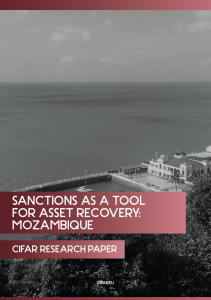Sanctions As a Tool For Asset Recovery: Mozambique
To date, the effectiveness, drawbacks, and limitations of using sanctions as an anti-corruption at the global and regional levels to respond to cases of suspected grand, cross-border corruption has not been assessed. In part, this is because the use of sanctions for cases of corruption is rather new and is usually tied to human rights abuses or cases of political instability.
However, because of this and the political nature of sanctions and their growing usage as one of the anti-corruption tools, there is room to consider whether this approach is the most effective to take or whether other mechanisms, such as those based on legal processes, could be more effective and more rules-based in fighting this form of corruption.
Key messages
- The Government of Mozambique and the international partners have been struggling to locate and repatriate the assets stolen in the Hidden-Debt scandal in 2016 which brought the country to economic collapse.
- Internal anti-corruption efforts appear to be responding to investigations taking place outside the country. An indictment in the US moved the Mozambican government to start proceedings in the Hidden-Debt scandal after a long period of inaction.
- From a long-term perspective, strengthening national law enforcement and a more independent judiciary is key for building Mozambique’s ability to prevent and deal with large cases of cross-border corruption effectively.
- Sanctions by international partners, including secondary sanctions on international business entities implicated in domestic corruption scandals, may be useful in sending a clear message that impunity cannot be tolerated and exerting pressure for long-term reform.
- The anti-corruption objective which any current sanctions related to Mozambique should support is to block the repayment and nullify the fraudulently acquired state loans.
Any further enquiries into the report or request for comment or quote can be directed to Lucia Cizmaziova, lcizmaziova@cifar.eu.

